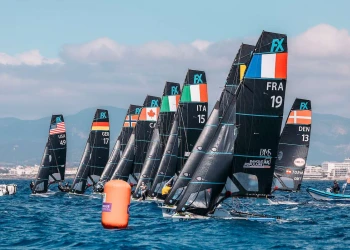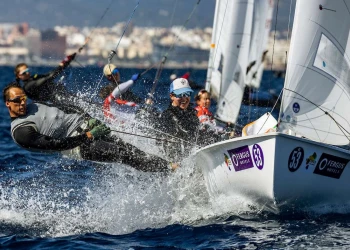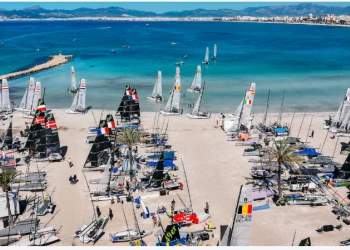
© Sailing Energy / Princesa Sofía Mallorca
Women of the Trofeo Princesa Sofía Mallorca highlight sailing
On International Women's Day, when some women point to the a lack of equality in many areas of life, many participants in the Trofeo Princesa Sofía Mallorca will reflect the fact that sailing remains a sport offering many equal opportunities. From a field of 1000 sailors some 500 women will compete at the in the 52nd edition of this wolrd renowned regatta which will once more turn the Bay of Palma into the epicentre of world Olympic sailing. Three sailors, a regatta official and a journalist explain how they enjoy a sport which is inclusive for women.
On International Women's Day five females who are regular participants in Olympic sailing regattas share their thoughts on initiatives to promote equality. They are International judge Ana Sánchez del Campo, communications expert Neus Jordi and sailors Pilar Lamadrid, Odile Van Aanholt and Freya Black. Together they highlight the sailing's ability to facilitate equal opportunities for women and for men. All have been regulars at the Trofeo Princesa Sofía Mallorca, which musters the complete roster of Olympic sailing classes from 29 March to 8 April on the waters of the Bay of Palma.
President of the Olympic Jury
Ana Sánchez del Campo is a well known, respected figure. An international regatta judge since 1996, she has been a member of the jury for the sailing at the last five Olympic Games. She will be in Paris 2024 this time as president of the international jury. "I consider sailing to be an egalitarian sport," she says, "because there is really nothing today that limits girls' access to sailing just because they are girls." She acknowledges that "many years ago, the world of sailing and the world of regattas were more of a male preserve" and admits that women still face some barriers, for example in terms of access to sponsors. "When they reach the senior categories, women also drop out of sailing more than men for different reasons which sometimes have to do with ongoing personal development but there are good options to continue if they want to, and strategies are also being developed so that when they leave the competitive life, women can continue their passion other areas of the sport," such as juries and other positions within the organisation of regattas. In the opinion of Sánchez del Campo who has presided over the jury of the Princess Sofia Trophy on many occasions, "the Mallorcan regatta has contributed to the development of many officials and many international judges, and it is a good platform for all these positions to have visibility."
The journalist's visión
One of these positions in the regatta organisation is held by the Mallorcan journalist Neus Jordi, a leading member of the press office of the Trofeo Princesa Sofia since 2005. She has covered the last four Olympic Games. In Beijing 2008 and London 2012 she was the press officer of the Royal Spanish Federation.
In Olympic sailing, 50% of the sailors were women. "But we saw more men on the podium, because we had five men's events, four women's events and one mixed event. This should now be finally solved in Paris 2024, with four men's events, four women's events and two mixed events, an even balance." The Nacra 17 made its debut as the first mixed Olympic class at Rio 2016, "an interesting and successful experiment, which gave many pages to fill and many questions to ask." In Marseille, the 470 will follow as the new mixed class: "It's about time we achieved this proper even balance. It has taken 124 years since the first women competed in the Olympic Games, some of them sailors," argues Neus Jordi. In Paris in 1900 22 women achieved this milestone, 2.2 percent of the total of 997 athletes, and participated in five sports: sailing, tennis, golf, horse riding and croquet. With just under a month to go until the start of the Sofia, more than 500 women have already pre-registered, about 40 per cent of the total number of sailors who will compete for glory in this 52nd edition.
Today's Olympians
The inclusion of mixed classes is one of the initiatives that the current Olympic sailors are highlighting. It is not exclusive to sailing, far from it, but more media-friendly sports often segregate more and have separate men's and women's leagues. "From my experience as a windsurfer, I think sailing is quite an egalitarian sport, because from a very young age we compete together, boys and girls," reflects Spanish windsurfer Pilar Lamadrid. "It's true that as we get older, the physical difference between boys and girls becomes more noticeable, which is inevitable."
Dutchwoman Odile Van Aanholt, nominated last year as Rolex World Sailor of the Year with her crew Annette Duetz after winning the world title and European runner-up in 49er FX, argues that "the fact that in this sport you have to use your mental skills and your physical skills almost equally to perform at the highest level makes it a unique sport, and that is what makes it so egalitarian for women and men, to the point that they can compete together almost on equal terms."
In this sense, the mixed classes are deemed to be a success. "There are an amazing opportunities for boys and girls to work together and push the boundaries of the sport," argues Britain's Freya Black, who sails the 49er FX with Saskia Tidey. For Lamadrid, "it is a real challenge: it's already difficult to sail as a pair in the same boat, even if you are the same gender, so putting a man and a woman together is a great idea, because you combine what characterises us women, that slightly more psychological and more reflective side, with the more impulsive and physical strengths of the men." Van Aanholt, who in the 52 Trofeo Princesa Sofía Mallorca hopes to defend the title she won last year, points out that it is not such a new initiative: "The mixed classes are like going back to the beginning: boys and girls compete together, like we used to do in the Optimist when we were kids."
The three sailors agree on the importance of creating female role models for the new generations, with the aim of increasing female representation. "Sailing is originally a masculine sport, and even today it is predominantly masculine, although more and more women are practising it," recalls Pilar Lamadrid, who is finalising her preparations to compete in the Sofía in the iQFOiL class.
For Freya Black, "the key is the youth classes, and making sure that young girls enjoy sailing, have the right support and guidance to be able to pursue an Olympic career." The Spanish iQFOiL sailor is clear: "We have the same ability to develop our tactical, strategic, psychological and physical skills as the men, so we can be on the same level as any male sailor." They will prove it in Paris 2024. And, before that, in the 52 Trofeo Princesa Sofía Mallorca.







